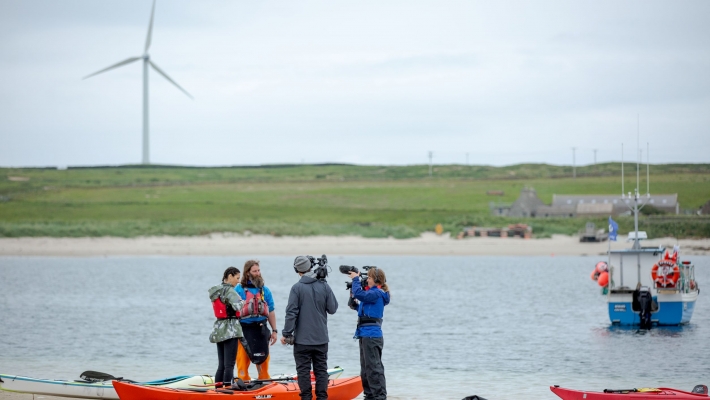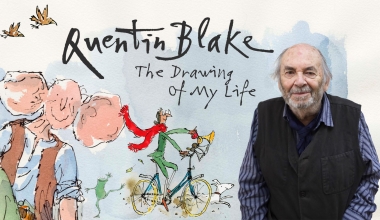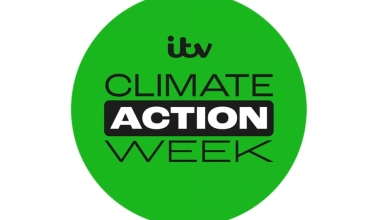
Wingspan films hailed in Glasgow – but what are the challenges of greening up production?
Wingspan’s programmes for ITV’s Climate Action Week were hailed at the Albert-organised ‘Telling Climate Stories Together’ panel in Glasgow during the first week of COP26 featuring the UK’s broadcaster CEO’s.
ITV’s Carolyn McCall cited ‘Joanna Lumley and the Human Swan’ as an example of Factual Entertainment putting climate action at the heart of prime time. ‘It did really, really well. It was following a climate activist. It was a very moving programme actually’. Meanwhile STV’s Simon Pitts said, “If you turned on STV last night as I’m sure Joe Biden did just before he flew off, you’d have seen… a fantastic show about the Orkney Islands which ITV showed too and the amazing example of tidal energy and wind energy and what that could do for the rest of the UK”.
This industry-facing attention follows on from the programmes’ premieres at the pre-COP Coptimism conference for policy-makers attended by directors Ian Leese and Kim Lomax.
Wingspan are proud that both films achieved Albert certification – Orkney getting a 2-star rating and an overall Albert score of 83% while Human Swan also received 2-stars and scored 76%. Albert have toughened the boundaries since 2020 when Wingspan's Dancing on Thin Ice scored a three star rating, with a 71% score.
Wingspan’s Creative Director Archie Baron reflects on the practical challenges of greening up production for factual producers.
We’ve obviously been very focussed these last months on ‘walking the walk as well as ‘talking the talk’ on sustainable production.
It’s we as producers who will need to deliver on the grand pledges all the broadcasters have now signed up to and the mandatory albert certification most will now demand. It will in fact be very challenging.
Albert certification is a great thing for the planet, us being good citizens and leaders and incorporating social purpose into our objectives. It forces us to measure everything we do and furthermore to think and commit to doing things differently. But it is necessarily no pushover.
While the carbon calculator measuring a production’s footprint can be done retrospectively, the Carbon Action Plan required for certification demands real attention from the whole team throughout production, leading to a much more proactive process encouraging us to make more sustainable choices.
It perhaps added at least one week of PM time to each production as well as more time for me as Exec and for our Head of Production. Some of what it forces us to do is genius. Phoning up hotels and asking for their energy policy could at scale easily leverage cultural change. Right now it’s painful! Hotel receptionists asking their managers who consult their owners etc etc. But it’s a great nudge and the combined purchasing power we have as an industry could have real impact.
But the biggest issue to factor in is time on location for our teams. On Orkney – a 4-day shoot on an incredibly tight budget – the PD and DV Director travelled there by train and ferry – a 27-hour journey each way. The presenters on 3-day shoots – and we had two though it would have obviously been much greener to have one! – partially flew. It may not be realistic to expect presenters on a 3 day gig to spend 2 days getting there and back. Nor would budgets allow us to pay talent for 5 days. But plane travel has a huge carbon footprint. Agents and their clients need to understand why a production won’t allow them to take domestic flights. It’s tricky – possibly existentially challenging for the normal docs we do which shoot single days here or there all over the country on tight budgets. It’s also hard to insist on train travel when it is so much more expensive than flying – and will be even more so now the government has lowered duty on domestic air travel.
Electric car travel may seem effortless, zeitgeisty and even glamorous if you believe the hype. But in practice the charging infrastructure is not yet good enough. Driving electric can add hours onto travel and shoot days, in ways which can easily tip already stretched tiny teams towards exhaustion and beyond the limits of safe working. It’s a health and safety issue for our teams for obvious reasons if days become hours longer. We also have no real leverage over crew and it’s anyway greener for them to drive their old diesel cars than switch – but that increases footprint etc. There is no question that in future our budgeted travel days and travel budgets will need to go up.
Despite our good efforts there were difficult decisions we made that could have easily cost us our albert certification. Without real training and support many people making normal shows who aren’t as fixated as we were at working towards incredibly green productions may fail certification. Albert went out of their way to assist us and we had to check with them at many points during production to explain certain problems and check we could still pass muster as sustainable productions. We took up quite a bit of their time. With mandatory certification across the industry, Albert probably needs to expand its team and we’ll definitely need as a production community better training and yes resources to help fund this new culture of content creation.
Producers have recently and enthusiastically embraced change in recent years. We all want to keep our environmental impact to a minimum. But as with Covid, doing all this costs money and that means budgets in future will need to reflect these realities.



